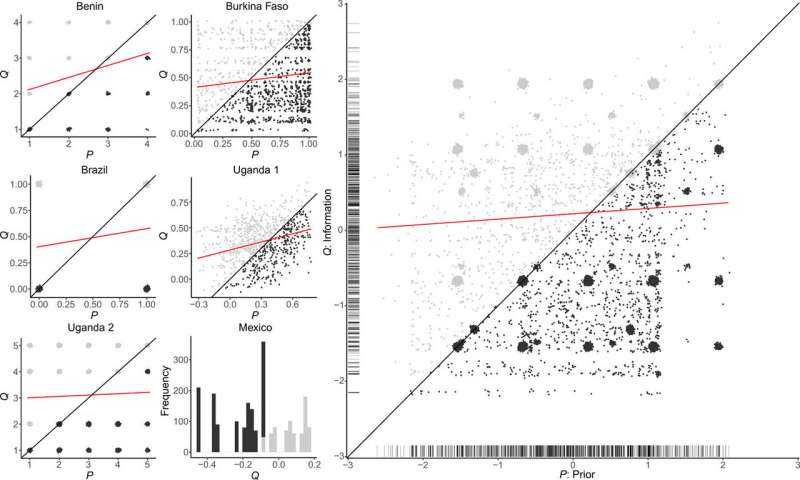Researchers study impact of information on voters

Voter information campaigns don't shape voter behavior, according to an analysis of data combined from studies independently conducted but coordinated by researchers working in six developing countries. The study, co-authored by William & Mary Department of Government faculty members Eric Arias and Paula M. Pickering, was published in Science Advances July 3.
The paper, "Voter information campaigns and political accountability: Cumulative findings from a preregistered meta-analysis of coordinated trials," reports some key findings of a meta-analysis of information combined from projects supported by the Evidence in Governance and Politics (EGAP) initiative. More comprehensive information about individual studies and the meta-analysis will be featured in a book to be published this summer by Cambridge University Press. Arias, assistant professor, and Pickering, associate professor, worked on separate studies as part of the five-year project with Arias researching in Mexico and Pickering in Uganda.
"We implemented a novel approach to cumulative learning, coordinating on the design of seven randomized controlled trials to be fielded in six countries by independent research teams," the paper explains. "Uncommonly for multisite trials in the social sciences, we jointly preregistered a meta-analysis of results in advance of seeing the data.
"We find no evidence overall that typical, nonpartisan voter information campaigns shape voter behavior, although exploratory and subgroup analyses suggest conditions under which informational campaigns could be more effective. These null estimated effects are too seldom published, yet they can be critical for scientific progress and cumulative, policy-relevant learning."
Seven independent research teams coordinated on the design of randomized trials in six developing countries, where information deficits are acute, according to the paper.
This set of studies was the inaugural project of the Metaketa Initiative, organized by the EGAP network, which seeks to incentivize replication, ensure coordination between researchers to enhance aggregation of findings and encourage design and reporting standards that guard against selective reporting and publication bias, researchers wrote. Following this inaugural Metaketa project, three others are already in place. Arias also is part of Metaketa IV related to community policing. Metaketa is a Basque word for accumulation.
At the various locations, "each study provided objective, nonpartisan performance information privately to individual voters within two months prior to an election," according to the paper. "The information was disseminated by flyers, text messages, or videos; was attributable to incumbent politicians or their parties; and was benchmarked to the performance of other politicians, either regionally or nationally."
The topics focused on legislative behavior in Benin, municipal spending irregularities in Brazil, the quality of public services in Burkina Faso, municipal government malfeasance in Mexico, policy positions and professional experience in one location in Uganda and budget irregularities in a second study across Uganda. A planned seventh study on incumbent criminality in India did not take place because of implementation challenges.
Although showing no measurable impact on voter behavior, researchers presented their findings as a significant window into the importance of this type of study.
"The consistency of our results underscores the value of replicating similar studies in diverse settings: Despite the heterogeneity of contexts, the estimated effects of the baseline informational interventions are quite uniformly weak," researchers wrote. "Our findings thus establish a comprehensive evidence base against which the efficacy of alternative types of informational interventions may be judged."
Arias and Pickering emphasized three takeaways.
The first is that the study's finding of no evidence of overall impact of standard, nonpartisan voter information campaigns urges development scholars and practitioners to pay close attention to the details of these campaigns. The second is that informing citizens in developing countries can help to keep politicians in check if careful attention is given to what information is provided, how it is provided and the political context in which it is provided.
Non-customized efforts in politically challenging environments are likely going to fail, according to Arias and Pickering.
The third takeaway is the flip side of that, and relates to what can be gleaned from published studies that tend to report the positive results of interventions such as information campaigns. After reading such studies, the inference ought not to be 'oh, information then works,' they added. Instead, it is important to read more closely and understand the conditions under which information worked in that particular case. At the same time, researchers also need to learn from the cases where it didn't work, so that knowledge is accumulated and understanding of information and political accountability is further improved.
Both Arias' study in Mexico and Pickering's in Uganda provided information to voters about the local government performance and point to conditions under which information works.
The Mexico study "emphasizes that voters will electorally punish (reward) the incumbent party when they receive information that the incumbent is engaged in significantly more (less) malfeasance than expected," according to Arias. "Moreover, we theorize that turnout will increase if information is very different from voters' expectations, but can decrease if information is not surprising in the voter's minds."
The Uganda project used text messages to provide information to voters about the quality of governance of incumbent politicians at two different local levels of government—the district and sub-county level.
"This study's findings suggest some conditions needed for information to affect voter decisions," according to Pickering. "This includes that factual information be salient, locally tailored and attributable to particular politicians about whose performance the public lacks sufficient information."
More information: Thad Dunning et al. Voter information campaigns and political accountability: Cumulative findings from a preregistered meta-analysis of coordinated trials, Science Advances (2019). DOI: 10.1126/sciadv.aaw2612
Journal information: Science Advances
Provided by The College of William & Mary



















